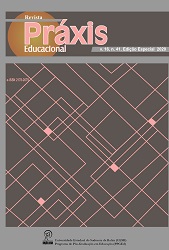ESPAÇO E LETRAMENTO NOS TRÊS PRIMEIROS ANOS DO ENSINO FUNDAMENTAL: A REALIDADE OBSERVADA
DOI:
https://doi.org/10.22481/praxisedu.v16i41.6253Palavras-chave:
Alfabetização, Letramento, Espaço, LudicidadeResumo
Este artigo é parte de uma pesquisa maior, de abordagem qualitativa, que abrange estudos sobre alfabetização e letramento. O objetivo deste texto é apresentar algumas considerações sobre a forma como os professores do bloco pedagógico, que compreende os três primeiros anos do Ensino Fundamental, vem utilizando o espaço de sala de aula como estratégia para o letramento. O campo empírico do estudo é uma escola pública municipal. Buscamos o embasamento legal para a explicar a organização e o objetivo do bloco de alfabetização e abordamos o letramento como processo em constante desenvolvimento na aprendizagem escolar, de modo especial, nas atividades lúdicas. Ao relacionar as Diretrizes Curriculares Nacionais para o Ensino Fundamental de Nove Anos com as evidências levantadas a partir da coleta de dados, foi possível perceber divergências entre o que a legislação determina para esta etapa e o que está acontecendo na prática, na escola observada. O trabalho com o letramento realizado em um ambiente propício às interações, dando continuidade a Educação Infantil, marcada pelos processos de aprendizagem a partir das vivências, fica registrado apenas no Projeto Político Pedagógico, mas é pouco observado nas práticas pedagógicas. A repetição toma o lugar das brincadeiras, a diversidade de textos perde espaço para fragmentação de palavras e assim, isso acaba refletindo na pouca exploração do espaço de sala de aula, já que as intervenções pouco promovem momentos lúdicos e de interação.
Downloads
Metrics
Downloads
Publicado
Como Citar
Edição
Seção
Licença
Copyright (c) 2020 Práxis Educacional

Este trabalho está licenciado sob uma licença Creative Commons Attribution-ShareAlike 4.0 International License.
Você é livre para:
Compartilhar - copia e redistribui o material em qualquer meio ou formato; Adapte - remixe, transforme e construa a partir do material para qualquer propósito, mesmo comercialmente. Esta licença é aceitável para Obras Culturais Livres. O licenciante não pode revogar essas liberdades, desde que você siga os termos da licença.
Sob os seguintes termos:
Atribuição - você deve dar o crédito apropriado, fornecer um link para a licença e indicar se alguma alteração foi feita. Você pode fazer isso de qualquer maneira razoável, mas não de uma forma que sugira que você ou seu uso seja aprovado pelo licenciante.
Não há restrições adicionais - Você não pode aplicar termos legais ou medidas tecnológicas que restrinjam legalmente outros para fazer qualquer uso permitido pela licença.










